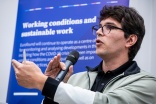Home › magazine › november 2017 › european reports › CMS 2017: international, digital
CMS 2017: international, digital
15th of December 2017German correspondent Alexandra Lachner reports from the recent WFBSC Congress and CMS in Berlin.
At CMS there were 429 exhibitors from 24 countries. Dr Christian Göke, chairman of Messe Berlin, commented: “The quality of the exhibitors, the increased number of international trade visitors and the variety of innovations presented set the standard for this year’s trade fair offering.”
This impression was shared by Ulrich Engenhardt and Marc van Ingelgem from Kärcher. “The fair benefited greatly from being held at the same time as the WFBSC Congress,” said Engenhardt.
“Well-attended international conferences can produce an enormous leap forward in quality – and can shift Germany’s focus to globally relevant themes.”
For many the key theme was the digital transformation of cleaning processes and robotics. For Kärcher this trend brings with it the potential for a significant increase in efficiency throughout the whole sector. Van Ingelgem explains: “At this very time of acute manpower shortage and increasing competition, such innovations can in fact widen the cleaning contractor’s sphere of activity.”
A certain hesitation was understandable, since given the customary small margins, the investment in automated solutions must be carefully considered. Efficiency is spiralling more and more rapidly. It is therefore vital to seize this opportunity to develop appropriate concepts.
There is much discussion as to whether human workers will be replaced by robots. Engenhardt commented: “This is already possible today for straightforward cleaning of large areas, where workers can be employed on other tasks and, as now, must keep the machines ready for operation. With more complex environments there is still in our view a long way to go towards achieving complete automation, if indeed it will ever be achieved.
"Our ceo Markus Asch uses the term Cobot – ie, collaborative robot – for the foreseeable future we shall need a form of cooperation which combines the precision of robots with the human talent for improvisation.”
On the subject of digitalisation and robotics, increasing importance is now being given to mobile solutions and associated battery technology. “We have seen a giant leap forward in recent years – and thanks to the high performance and durability of lithium-ion batteries I would venture to predict that in five years’ time we shall have virtually no more vacuum cleaners with cables,” says van Ingelgem.
“Accidents caused by slipping and falling cost considerably more than investment in cordless machines. This also makes work easier, faster and more flexible.”
In contrast to these developments however, there is an increased demand for mechanical, non-electrical and ultra-robust solutions. “There are customers in every country who want these products. And they are appropriate in countries where efficiency and labour costs are of less importance,” says van Ingelgem.
Van Ingelgem and Engenhardt see continued potential for the sector. “The industry need have no fears for the future. There are enough growth areas for both manufacturers and contract cleaners. As far as digitalisation is concerned, one major challenge will be coming to grips with the possible synergies of open platforms. In our view, there is little sense in each manufacturer going their own way here. Examples from other industries show this is inefficient and not in the best interests of the customer.”









